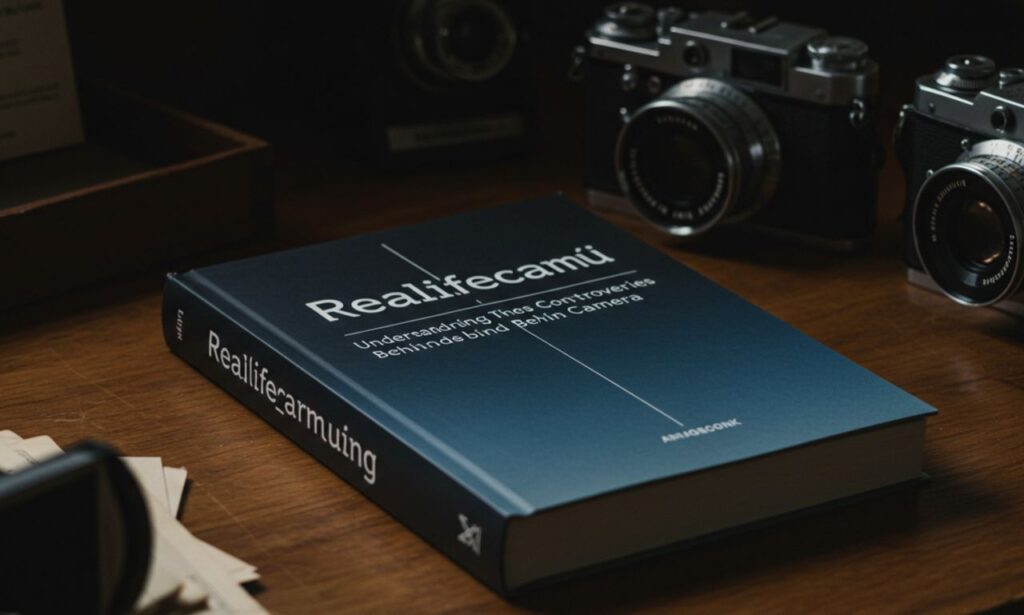In a world where technology continues to blur the lines of privacy and voyeurism, Realifecamù has emerged as a fascinating yet controversial phenomenon. Imagine having access to live feeds from people’s homes, offering an unfiltered glimpse into their everyday lives. It sounds intriguing, but it raises numerous questions about ethics and consent.
As we dive deeper into this topic, we’ll explore what Realifecamù is all about and the myriad controversies that surround it. From ethical dilemmas to its impact on relationships, we’re here to unpack everything you need to know about this modern voyeuristic platform. So grab your favorite beverage and get ready for an eye-opening journey through the lens of Realifecamù.
What is Realifecamù?
Realifecamù is a unique concept that blurs the lines between reality and voyeurism. It offers an unfiltered glimpse into the lives of people across various locations, capturing everyday moments as they unfold.
This platform utilizes live-streaming technology to showcase real-life scenarios, allowing viewers to observe without intrusion. Users can tune in to watch how others navigate their daily routines, providing an experience that feels both intimate and distant.
The idea behind Realifecamù taps into curiosity about human behavior. It invites audiences to witness spontaneity in its rawest form. Unlike traditional media, this format presents life unscripted—no actors or rehearsed dialogues.
As fascinating as it sounds, Realifecamù raises questions about privacy and ethics within this new realm of entertainment. The allure lies not just in observation but also in understanding the implications of such transparency in our digital age.
Controversies surrounding the use of Realifecam
Realifecam has sparked significant debate, drawing attention for its unconventional approach to voyeurism. Critics argue that the platform promotes a troubling culture of surveillance, allowing users to watch strangers without consent.
This raises questions about boundaries and personal space. Many believe it blurs the line between entertainment and exploitation. Users may find themselves in precarious situations where their privacy is compromised.
Furthermore, there’s concern over how this content can affect individuals featured on the site. The potential for harassment or unwanted attention looms large when people are unknowingly exposed to a global audience.
Many advocates call for stricter regulations surrounding such platforms. They emphasize the need for ethical guidelines that respect individual rights while navigating this new digital landscape. As debates continue, Realifecam remains at the forefront of discussions about privacy and morality in an increasingly connected world.
The ethical concerns and privacy issues
Realifecamù raises significant ethical concerns regarding privacy. The very essence of the platform revolves around capturing real-life moments without explicit consent. This creates a troubling dynamic between personal boundaries and voyeurism.
Individuals featured on such platforms may not even be aware they’re being observed. This can lead to feelings of vulnerability and exploitation, particularly for those unaware that their lives are under scrutiny.
Moreover, the blurred lines between public and private life become more pronounced in this digital age. What was once considered an intimate moment can quickly turn into content for mass consumption.
The potential misuse of footage also poses serious risks. Videos could easily be manipulated or shared beyond the intended audience, causing lasting harm to individuals’ reputations and mental well-being.
Impact on society and relationships
The rise of Realifecamù has reshaped how we perceive intimacy and privacy in modern life. With real-time streaming, personal moments are now subject to public scrutiny. This shift can lead to a sense of disconnection among individuals.
Relationships often thrive on trust and secrecy. However, the omnipresence of cameras can create tension between partners. Jealousy may arise as one partner questions what is being shown or who is watching.
Moreover, the blurring lines between private and public spheres challenge societal norms around consent. What was once considered confidential becomes fodder for voyeurism, altering our interactions with friends and loved ones.
As people grapple with this new reality, many find themselves questioning their own boundaries. The impact reaches beyond individual relationships into community dynamics as well—shaping perceptions of normalcy in social behavior.
Pros and cons of using Realifecam
Realifecam offers a unique experience for those drawn to voyeuristic entertainment. Users can observe everyday life in real-time, providing an intriguing glimpse into the lives of strangers. This aspect fosters a sense of connection and curiosity.
On the flip side, there are significant downsides. The lack of consent from individuals being filmed raises serious ethical questions. Many people may not be aware they are being watched, leading to potential invasions of privacy.
Additionally, excessive use could lead to desensitization towards personal boundaries and relationships. It might encourage unhealthy behaviors or attitudes toward intimacy.
There’s also the risk of addiction; users may find themselves spending too much time consuming this content instead of engaging meaningfully with their own lives and relationships. Balancing these factors is crucial when navigating the allure and drawbacks of Realifecam.
Alternatives to Realifecam for voyeuristic entertainment
For those interested in voyeuristic entertainment but wary of Realifecamù, several alternatives exist. Live webcam shows have gained popularity, offering a more controlled and consensual environment. Many platforms allow users to interact with performers, creating an engaging experience.
Another option is virtual reality experiences that simulate voyeurism while ensuring privacy and consent. These immersive technologies provide an exciting way to explore fantasies without infringing on anyone’s rights.
Social media platforms also offer glimpses into people’s lives through curated content. Influencers often share candid moments that can satisfy curiosity without crossing ethical lines.
Moreover, adult film sites now feature amateur content where individuals willingly share their private moments. This approach allows for exploration within mutually agreed boundaries.
Each alternative provides unique opportunities for engagement while promoting respect for personal privacy and consent in the digital age.
Exploring the implications of Realifecam in modern society
Realifecamù has stirred a profound conversation about privacy and consent. As people navigate an increasingly digital landscape, the lines between public and private life blur further.
The platform invites viewers into intimate settings, raising questions about what we consider acceptable in entertainment. It’s not merely voyeurism; it challenges social norms regarding exposure and self-presentation.
Moreover, this phenomenon can lead to desensitization toward real-life interactions. When genuine connections become overshadowed by curated online experiences, society may face deeper emotional detachment.
As users engage with Realifecamù content, they must grapple with their own values around respect for personal boundaries. The implications extend beyond individual behavior; they reflect broader cultural shifts that redefine intimacy in the digital age.
Navigating these waters requires critical thinking. Understanding how platforms like Realifecam influence collective attitudes will shape future conversations on ethics and technology integration.
Conclusion
Realifecamù represents a complex intersection of voyeurism, technology, and ethics. As the concept continues to evolve, it raises important questions about personal privacy and societal norms. While some users find thrill in its offerings, others express concern over the implications for consent and intimacy.
The controversies surrounding Realifecam are not just about individual choice but also reflect broader issues within our digital age. The ethical considerations cannot be overlooked; they challenge us to think critically about what we deem acceptable in terms of surveillance and entertainment.
As we navigate this new landscape, it’s essential to weigh the pros against the cons. For those interested in voyeuristic content without crossing ethical boundaries, alternatives exist that respect both creators’ rights and viewers’ curiosities.
Understanding Realifecamù means engaging with these challenges thoughtfully. It encourages dialogue about how technology affects our lives at every level—socially, personally, and ethically—prompting ongoing reflection on where we draw lines as a society moving forward.






